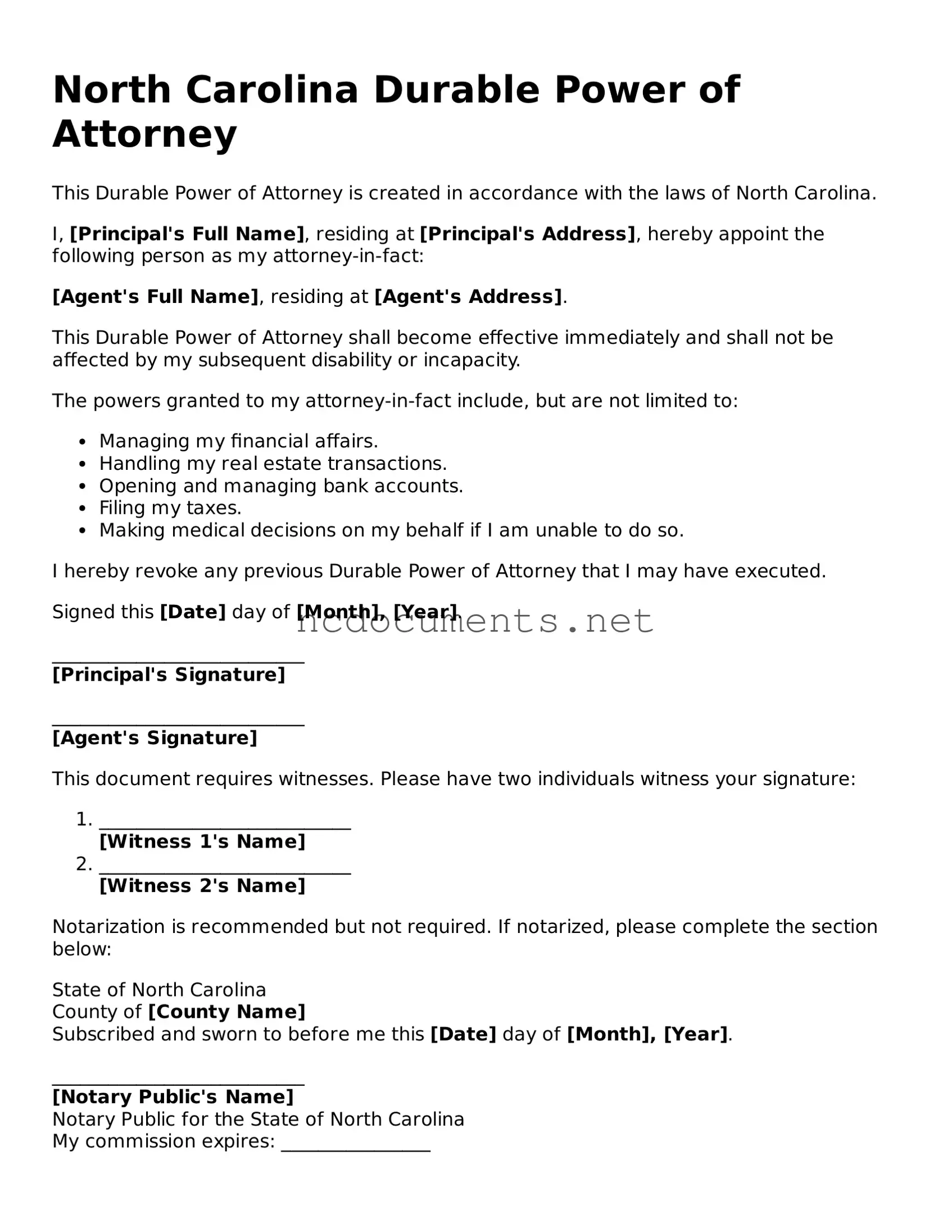The North Carolina Durable Power of Attorney form shares similarities with a General Power of Attorney. Both documents grant authority to an agent to make decisions on behalf of the principal. However, the key distinction lies in durability. A General Power of Attorney becomes invalid if the principal becomes incapacitated, while a Durable Power of Attorney remains effective even in such circumstances. This makes the Durable Power of Attorney a more robust option for long-term planning.
Another document that parallels the Durable Power of Attorney is the Medical Power of Attorney. While the Durable Power of Attorney focuses on financial and legal decisions, the Medical Power of Attorney specifically addresses healthcare choices. Both documents empower an agent to act on behalf of the principal, but the Medical Power of Attorney is tailored for medical decisions, ensuring that healthcare preferences are honored in times of incapacity.
The Healthcare Proxy is similar to the Medical Power of Attorney but is often used interchangeably. Both documents designate someone to make medical decisions when the principal is unable to do so. However, the Healthcare Proxy is typically more focused on end-of-life decisions and may not cover broader healthcare matters. Like the Durable Power of Attorney, it emphasizes the importance of appointing a trusted individual to advocate for the principal’s wishes.
A Living Will also shares some characteristics with the Durable Power of Attorney, particularly in the context of healthcare decisions. While a Living Will outlines specific medical treatments a person does or does not want in certain situations, the Durable Power of Attorney allows an agent to make those decisions. Together, they provide a comprehensive approach to ensuring that a person's healthcare preferences are respected.
The Revocable Trust is another document that can be compared to the Durable Power of Attorney. Both instruments allow for the management of assets, but they serve different purposes. A Revocable Trust can help avoid probate and manage assets during the grantor's lifetime and after death. In contrast, the Durable Power of Attorney focuses on appointing someone to make decisions on behalf of the principal, particularly during periods of incapacity.
The Financial Power of Attorney is closely related to the Durable Power of Attorney, as both documents grant authority over financial matters. The Financial Power of Attorney may be limited to specific transactions or timeframes, whereas the Durable Power of Attorney is generally broader and remains effective despite the principal's incapacity. This distinction is crucial for individuals seeking comprehensive financial management plans.
The Guardian Appointment form is another document that can be likened to the Durable Power of Attorney. While the Durable Power of Attorney allows an agent to act on behalf of the principal, the Guardian Appointment form designates a guardian for minor children or incapacitated adults. Both documents emphasize the importance of choosing a trusted individual to make decisions, whether related to finances or personal care.
The Advance Directive for Health Care is similar to the Durable Power of Attorney in that it allows individuals to express their healthcare wishes. While the Durable Power of Attorney designates someone to make decisions, the Advance Directive provides written instructions regarding treatment preferences. Both documents are vital in ensuring that a person’s wishes are respected during medical emergencies.
Lastly, the Will, while primarily a posthumous document, shares some thematic similarities with the Durable Power of Attorney. Both documents involve the distribution of assets and the appointment of trusted individuals to manage affairs. However, the Will takes effect after death, whereas the Durable Power of Attorney is active during the principal's lifetime, particularly in times of incapacity. Understanding these differences is essential for effective estate planning.

